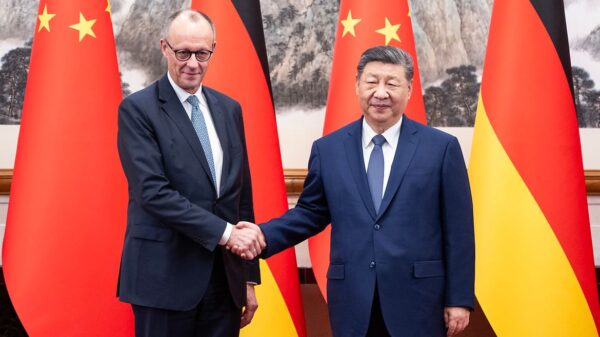
Receive free China updates
We’ll send you a myFT Daily Digest email rounding up the latest China news every morning.
This article is an on-site version of our Swamp Notes newsletter. Sign up here to get the newsletter sent straight to your inbox every Monday and Friday
I had the pleasure this past Friday of doing a fireside chat with Senator Mark Warner, the chair of the Senate Select Committee on Intelligence. At the event, which was hosted by the German Marshall Fund (you can stream the video here), Warner had plenty of interesting things to say about the US-China technology competition and the rise of artificial intelligence — which the US government is struggling to understand, let alone regulate.
For starters, AI is, according to him, no longer just a fight among the biggest and most powerful countries and companies (think China versus Google or Amazon). He said that just during the past few months, the state of technology play had changed in such a way that he believes we are going to see a variety of new countries (like the UAE) and companies (not just Big Tech firms like Meta, which recently announced its new commercial product designed to compete with Silicon Valley rivals) but also start-ups able to compete in the space. This belies the argument put forth by Kai-Fu Lee in his book AI Superpowers, which holds that this is basically a competition between two systems — the US and China.
On the one hand, you might see that as good news — there may be more competition in the AI space than we had first thought. On the other hand, it will become harder to develop coalitions of the willing to rein in the technology, when so many countries have a horse in the game. Indeed, Warner cast doubt on the idea that US regulators would be able to come up with a bill to regulate the technology here at home by the end of the year (though he stressed the need to do so) despite the fact that the issue is totally bipartisan. That’s worrisome, because if a bill doesn’t get done by then, it may not get done for another several years — and the US risks ceding the regulatory territory to China and Europe, as it has often done around technology in the last decade.
This goes to a larger issue, which is how an economy as decentralised as the US can compete in an era in which dot connection is more important than ever before. Just think about the myriad implications of AI on the economy. What will the job destruction implications be, particularly as the US enters new economic alliances with lower wage service economies like India? Are we about to see an “India shock” in technology and services that will mirror the “China shock” to labour markets over the last 20 years? What will the effect of AI be on monetary policy, given that such a broad-based and widely adopted technology is likely to be quite deflationary? How can we ever tease out the “dual use” potential — meaning the possibility of both military and civilian use — of AI, as we think about what intellectual property should and shouldn’t be ringfenced away from China in the process of “de-risking” supply chains?
There is plenty here that we didn’t even get to. For example, assuming that the US-China technology cold war continues to heat up (as it seems it inevitably will — just look at the latest news about China hacking secretary of commerce Gina Raimondo’s emails) then what, exactly, constitutes an act of war in the tech space? Certain things are clear — if China were to make a move on Taiwan, or try to blockade semiconductor supply chains (as many in the US security community believe it will within the decade), then it’s pretty clear the US would take military action. But what about a high tech takedown of GPS satellites? That wouldn’t put troops on the ground, but what would the ramifications of such an act be? There’s a huge area of grey here, and no good, clear lines on either side.
Finally, Warner noted during many parts of our conversation that the US needs a new lexicon to speak about the post-neoliberal world (he didn’t say so, but I don’t think he likes that word either, Ed). We can’t really speak about “the West and the rest” anymore, at a time when India or parts of Africa might be pulled into new AI or clean tech alliances. Likewise, alliances of democratic values can be very squishy depending on what value you are talking about. The “tripolar world” works sometimes, but other times the US and EU seem more or less on the same page in terms of wanting to create mutual standards for data (like the new US-EU agreement on data sharing) and green supply chains.
Whew. It seems we need an entirely new lexicon to speak about the new world order. Ed, any new words you’d want to introduce?
Recommended reading
Sarah O’Connor, who is now officially my favourite FT columnist, argues that we should relearn the art of leisure. A good idea in advance of both AI-based job disruption and (more immediately, at least I hope) summer.
I can’t wait for Barbenheimer, the double feature of Oppenheimer and Barbie, both of which I am dying to see. This combo really hits the sweet spot of my fashion-magazine reading physics geek self. But really, let’s not debate viewing order — it’s obviously Oppenheimer, then Barbie. You can’t have any pudding unless you eat your meat!
Years after myself and other colleagues have written about it, The Fourth Turning, that cult book on recurring cycles in American history (we are supposedly entering a new one in 2024) finally makes its way into the New York Times. Perhaps this means the cycle has already turned?
I recently killed time in a Washington hotel room by watching The Core, a delicious 2003 B movie about a team of astronauts and scientists who drill into the core of the planet to restart its rotation cycle, thus preventing global destruction. Nothing like a good-bad sci-fi film in my opinion. But now, as a result, I really want to read Laura Trethewey’s new book about oceanic exploration and it’s dangers, The Deepest Map: The High-Stakes Race to Chart the World’s Oceans.
And finally, an interesting New York Times style piece about the renovated farmhouse as America’s new McMansion. There are countless overpriced versions of this house within a three-hour radius of my New York home, and apparently, the colonial revival style tends to rise in popularity during periods of heightened nationalism. Hmmm . . .
Edward Luce responds
Rana, forgive the brevity of my response: I’m not good at coining new terms so I wouldn’t know where to begin. If I had ChatGPT within reach it would surely do better. Depending on what we are talking about, I get the utility of “bipolar” (a US-China dominated world), “multipolar” (less so), and “re-globalisation” (as countries regionalise or “friendshore” critical supply chains). This isn’t a catchphrase but I think “the revenge of geopolitics/history” is a richer description of the challenges we face as the 21st century matures.
In my pessimistic moments I might say that we are heading for a post-anthropomorphic age due to global warming, but we are not there yet. Ultimately, I think life is getting too complicated for the sweeping generalisations implied by such catchphrases. We are witnessing both ultraliberal and post-neoliberal trends, high inflation and disinflation, a post-western world and the resurgence of the west. Autocracy has been staging a comeback but it is increasingly failing to deliver, even in China. Populism is going both up and down depending on which democracy you’re looking at. There is no simple tagline to which these competing trends can be reduced.
Your feedback
And now a word from our Swampians . . .
In response to “A lament for British silliness”:
“Bidenomics does not ‘need more economics’. It has simply failed to find what it should be looking for. The ‘Economics of Innovation and System Transition’ is a well-established branch of complexity economics. Applied to energy, that extra “E”, EEIST is a UK government funded project of deep worth. Others this side of the pond have failed to spot it too. When Rachel Reeves, UK Shadow Chancellor, lauded Bidenomics recently stateside, she missed a trick by not mentioning the homegrown UK variety. It’s like having a child, but not realising how it was conceived.” — Mike Clark
Your feedback
We’d love to hear from you. You can email the team on swampnotes@ft.com, contact Ed on edward.luce@ft.com and Rana on rana.foroohar@ft.com, and follow them on Twitter at @RanaForoohar and @EdwardGLuce. We may feature an excerpt of your response in the next newsletter


